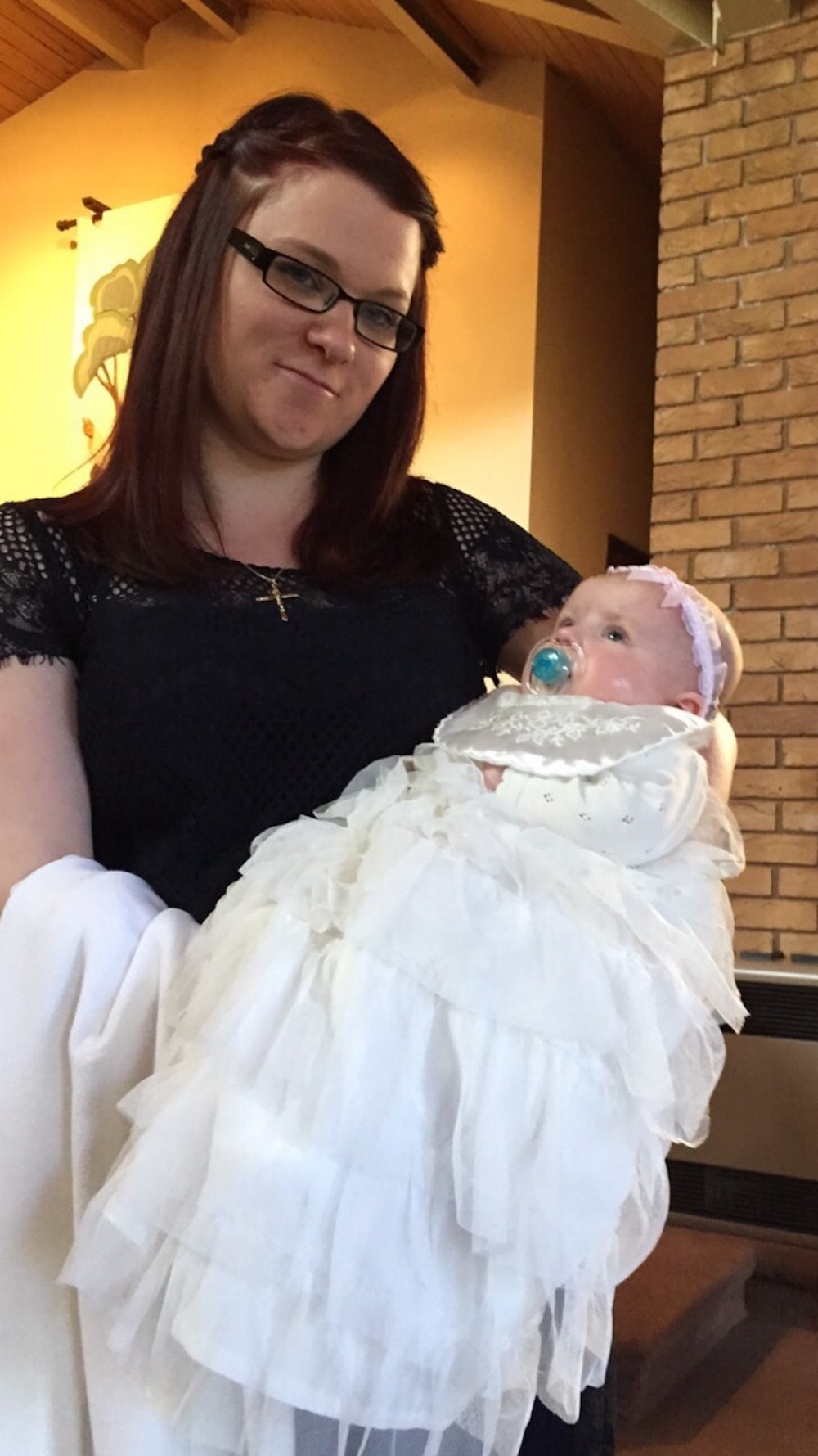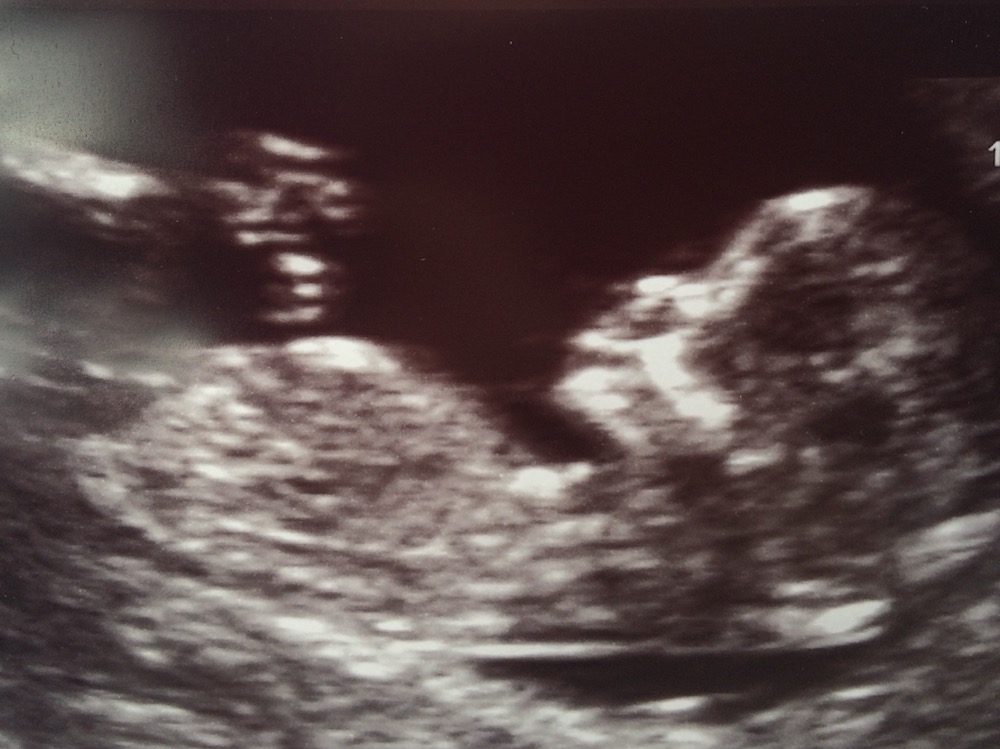I Suffered with Severe Postnatal Depression and PTSD Following a Traumatic Labour
updated on Feb 19, 2018

After the distressing birth of her first child, Kerry Thomas lost all faith in medical professionals. But when she found the right counsellor, she was finally able to work through her trauma and bond with her daughter
I met my husband five years ago and instantly fell in love. He worked away a lot, but when he came home I was always so excited to see him. One evening, I went upstairs and there were candles all over the bedroom, he was stood there with a ring and he proposed.
We soon decided to start trying for a baby, but six months went past with nothing. Then another six months. I ended up being referred to the hospital for an ultrasound to check my reproductive system. It turned out all those missed periods were because of polycystic ovary syndrome (PCOS) and endometriosis. That’s the reason I couldn’t fall pregnant naturally: I wasn’t ovulating.
Kerry's Scan
I was depressed. It was a rough few months, and I even tried to end things with my husband as I didn’t want to be the reason he couldn’t have children. Eventually, we were referred to a gynaecologist and started fertility treatment. Months passed with nothing. It left us with only IVF as an option. By this point, I was really struggling mentally and felt like a failure. I was a woman and I couldn’t reproduce.
We went for the IVF treatment and, with the help of a fantastic team, it worked. We were completely over the moon, I must have gone through 20 pregnancy tests that week, just to make sure!
Throughout my pregnancy, I lived in a bubble. I was terrified to do anything strenuous or eat anything that could affect the baby. I ended up with severe morning sickness, sciatica and pelvic girdle pain. My GP put me on medication for the sickness, but I was too scared to even take paracetamol when I was in pain.
I went into labour four weeks earlier than my due date and I didn’t even realise. I was sat in bed and said to my husband: “I have awful stomach ache from that pizza.” After being sat up for while, he told me to let him know when I had pains. It turned out I was having contractions!
I didn’t have the moment, like in the movies, when you cry happy tears, want to hold your baby and take pictures
We went to the hospital and when we arrived I was 4cm dilated. They transferred me to a delivery room and it was all going well, but our little girl was still back to back. I was in labour for 16 hours. They had to break my waters. She got stuck at 7cm and was still back to back. I tore. They ended up doing an episiotomy and used forceps to deliver her as her heart rate had dropped too low.
At that point, I was in and out of consciousness. I still can’t recall the full extent of what happened during my labour.
I didn’t have the moment, like in the movies, when you cry happy tears, want to hold your baby and take pictures. I didn’t want to hold her at all.
I was told to get up, get showered and that I’d be staying in the hospital. I thought the worst part was over. But I collapsed in the shower; I had bladder retention. I needed a catheter, but they couldn’t place the catheter in because of the swelling. I had to have gas and air just so they could pass the tube through. Even now, I still have flashbacks about that.

Kerry and her daughter
Nearly a week went by and I wasn’t getting better – in fact, I was getting worse. I had doctor after doctor come and take a peek and walk away having a discussion about me as if I wasn’t there. I was in agony, but I also lost my dignity.
On day six, I was discharged. They said I just had bruising and that the community midwife would take care of me. Nine hours later, I was rushed back into hospital. The community midwife came to my house and said she hadn’t seen anything like the injury I had sustained.
With help from our family, we were able to go private. When I arrived, the consultant did a CT scan and blood tests. It turned out I had sepsis and an infected haematoma. I had major surgery and was placed on oxygen as they were worried about organ failure. Finally I had some answers, and I still wonder whether, if we hadn’t gone back to the hospital, would I be here today? There were days back then when I thought that would have been for the best. I remained there for a further two weeks; I still hadn’t bonded with my baby.
When I was discharged, I couldn’t walk unaided. I had to see an osteopath privately, as the hospital discharged me without any follow-up. It took me four months to walk comfortably, and six until I was walking normally. I’m still seeing a chiropractor.
I was struggling mentally. I was having nightmares and flashbacks. I couldn’t sleep.
I was constantly crying. I still didn’t have that special bond with my daughter. But when I finally did get it, the anxiety and paranoia became awful. I would sit in the kitchen crying when she slept. I watched the clock for when my husband was coming back home. I just wanted to pack a bag and leave. One day, I got in my car when he came home and just drove away.
Months passed and I became very attached to my daughter. I wouldn’t let people look after her and criticised everything my husband did. I wouldn’t take her out through fear of someone taking her. When I did, I gripped the buggy so tight that my knuckles went white.
After six months, my husband said I needed to speak to someone. My GP referred me for assessment by the mental health team. When I went to see them, my defences were up. I hated the NHS. I hated the staff for what they did to me. I sat down and was asked: “Why are you here? Tell me what’s wrong and what you feel on a daily basis?” I was shocked and didn’t know what to say. When I finally plucked up the courage and said that I’d had a traumatic birth and it was the hospital’s fault, his reply – before I could even finish – was: “You seem like you don’t want to be here.” My wall went back up.
I went to see a different counsellor and I saw a different GP, but I was terrified. I felt like a complete failure. But, finally, someone listened.

Kerry and her daughter
It took me a month of seeing her weekly before I completely opened up, but once I did, my counsellor told me that I was suffering with PTSD and postnatal depression. They said they would help me. They said I was going to be OK, and I was placed on anti-depressants.
My counsellor listened to my story and was shocked. She worked with me through CBT and helped with exercises to deal with the anxiety. After a couple of months, I found it easier to talk to her. I was still having flashbacks, trying to put together what happened during my labour. I had days when I just sat and cried. I still couldn’t sleep. I felt so low. It got to the point where I wanted out. We went through every feeling I had week by week and worked on trying to make sense of my labour.
I stuck with the counselling and it really did help me. I saw her for two years, and it helped because someone was listening to me.
Two years on and I am now in a place to share my story. I want to share it to make women and men aware that getting help and, most importantly, having someone listen can help them. I never knew or understood my mental illnesses before I reached out, but we all need someone to listen and support us.
I can now enjoy my time with my daughter. I won’t get that time back, but I can now look forward to what’s to come and enjoy seeing her grow.
Kerry’s story highlights the prolonged and far-reaching implications of birth trauma. Not only does it affect mother-baby bonding, it can also severely impact anxiety levels and day-to-day functioning. Reaching out is important, and not every issue can be addressed quickly; sometimes counselling takes time. Kerry’s story shows the need to stick with treatment, and to keep believing that recovery is possible.

Join 100,000+ subscribers
Stay in the loop with everything Happiful

